By Mike DuBose with David Hurst, DVM
Animal owners will go through horrific grieving when their furry companions die — sometimes multiple times with different loving companions. The Journal of Mental Health Counseling documents the deaths of pets can be equally traumatic or worse than close friends and family members dying. University research verified 30-percent of pet owners reported grief from the loss of pets lasting six or more months. Some never completely recover from losing their beloved “Best Friends.” Grieving pet parents often don’t know how or when to express their sadness. Many hide or repress their guilt, grief, and even shame by “tidal waves” of unpredictable emotions that overwhelm and ambush them.
We blame ourselves for their deaths. Because animals can’t communicate, it’s difficult to tell when they’re sick or in pain. When owners finally notice illness symptoms, like cancer, it may be too late. We re-live the time before learning about the animal’s disease, berating ourselves over clues we feel should have been identified earlier. Pet deaths can be tragic accidents (being hit by cars, wandering and not finding their way back home, or owners not being there to protect them.). As a result, individuals often chastise themselves, experience deep guilt, and have nightmarish regrets. They constantly replay painful memories, telling themselves, “I could have saved my cherished baby, if only I had . . .”
Individuals who don’t have deep animal bonds may respond to your grief by saying insensitive, harsh words like: “Why are you so upset? It’s just an animal. Go buy another one. Get over it.” Forgive them and ignore their painful comments since they haven’t walked in your depressed and suffering shoes.
Many inaccurately believe that grief comes in organized stages. There’s simply no “right way” to grieve nor a cookie-cutter-template for traveling through the painful thunderstorm. Recognize your sadness—Grief is an intense emotion and everyone must work through it in their personal ways and own timelines. Be patient with yourself and others. Don’t suppress your feelings or set limits on the amount of time you grieve in your pet’s absence.
Gently share the news with others. Sometimes, we’re so sad ourselves that we delay telling relatives and friends about our pets’ absence, especially with small children or grandchildren who may not understand. You want to spare them painful details, but don’t try to keep the death a secret. Our grandchildren seem to understand when we told them: “They’re in Heaven now . . . waiting on us.” Of course, get ready for questions like “How did they get there?”
Serve in positive ways to honor your pet. Begin the healing process by making financial donations to local animal ministries in your beloved pet’s name, helping other animals find new homes. Volunteer with local adoption non-profits like Pawmetto Lifeline (Columbia, SC). Celebrating the times with your pet by positively giving back can be purposeful and therapeutic.
Focus on happy times. Following your pet’s death, it’s difficult to look at your loved one’s memories like photos. However, don’t delete or trash them; rather, move them to a computer folder or store items out-of-sight until more time has passed. Once the emotional wound is not so raw, you can decide which items to keep in remembrance. Think about the good times and mentally replay happy events. While it’s difficult, don’t allow your mind to drift into darkness and re-enact the end-events when negative thoughts surface.
Take care of yourself. Many pet owners exercise, like walking and running with their dogs, so continue performing these good habits. When you’re suffering through grief, your immune, physical, and mental health systems often deteriorate. During stress, the Cleveland Clinic reports harmful hormones, like Cortisol, which affect every organ and tissue, are excessively pumped into our bloodstreams. This can promote illness, seclusion, sadness, and depression. Exercise, such as brisk walking in good weather while admiring nature or inside the mall, is “potent medicine” that releases healthy, positive-mood chemicals (Endorphins).
Don’t rush to adopt. Some pet parents mistakenly believe they can quickly “replace” their lost loved ones. However, no two pets are alike. Your new animal won’t have similar characteristics you found so endearing in your deceased one. You may feel disloyal towards your absent loved one and sense guilt about adopting another pet. But it’s important to note that adding new family members doesn’t negate that you’ll always keep a reserved spot in your heart for your deceased friend(s). Ensure you, family members, and potential new animal companions have mutual positive, loving chemistry.
Seek help and stay busy. Talk with like-minded animal-lovers, but also consider attending classes with others who are grief-stricken (some churches offer them), joining a grief recovery and share group, and seeing professional grief counselors (visit www.griefshare.org for local resources). Keep your mind occupied and body challenged to avoid dwelling on your loss.
Pray. Seek God for comfort. Life is filled with pain, grief, and suffering, but also many blessings. Your faith can guide you through dreadful, intense storms. If God created the universe, He’s there to help you.
The bottom line: While it seems the pain from losing our beloved pets will last forever, time will slowly heal. Eventually, you’ll look back on fond memories of departed companions with smiles and thanksgiving. Our final article titled “Will We See Our Pets in Heaven?” will appear next. This series is dedicated to our furry friends who are waiting for us in paradise.
Dr. Hurst is a licensed veterinarian with Friarsgate Animal Hospital in Columbia, SC. He is a graduate of Newberry College and University of Georgia’s College of Veterinary Medicine.
The DuBose family’s purpose is to “Create Opportunities to Improve Lives.” Mike is a former licensed counselor and staff member with USC’s graduate school. In 1987, he founded his family of companies and wrote the book “The Art of Building Great Businesses.” Visit his nonprofit website www.mikedubose.com for free access to his books and 100+ published articles, including business, travel, and personal topics, in addition to research with Surb Guram, MD.


